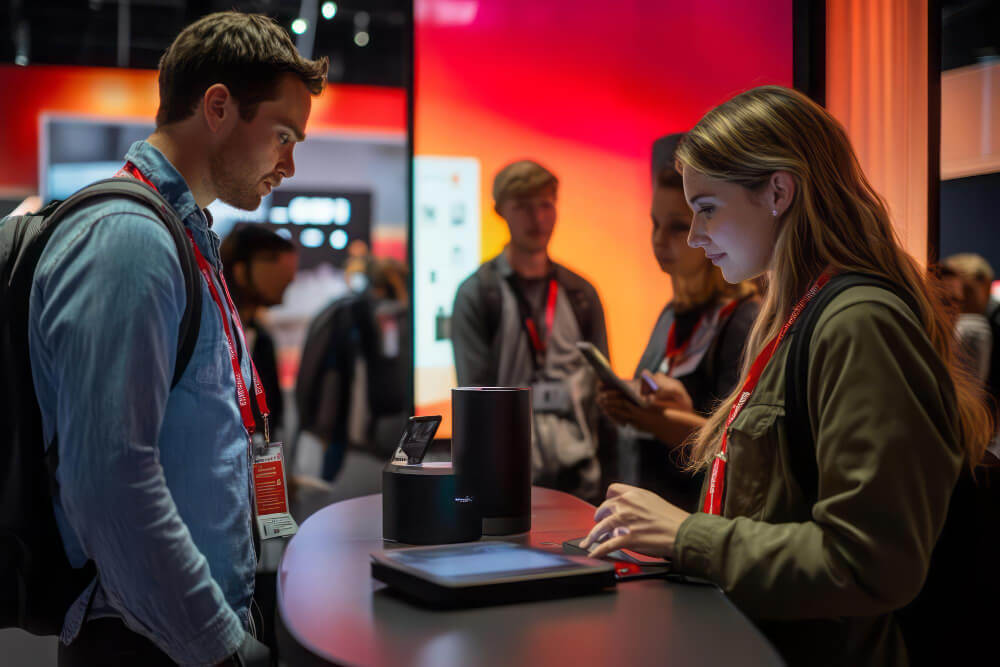The esports scene has really taken off in the last ten years, going from small gaming contests to huge entertainment events. With global earnings set to hit $5.9 billion by 2029, the chance to host live esports events is more appealing than ever.
But pulling off a successful esports event takes careful planning, the right tech, and a good grasp of what gamers want.
This guide covers the basics of esports event management, sharing tips on how to plan and run an event to promise a rich experience.
Table of Contents
What is Esports Event Management All About?
Esports event management solutions cater to a mix of virtual and on-site gaming events. This fusion leads to an atmosphere of fun and excitement where attendees get to witness action live.

Different from regular sports, esports tournaments usually need tricky tech setups, data that updates as it happens, and fans from all over watching online. Because of this mix, planning these events means thinking carefully about both the people who will be present and the ones watching from home.
Key Parts of Esports Event Management
Game choice: Picking the right game is super important. You should think about how popular the game is, how engaged the community is, and how it fits with what you want to achieve at the event.
Teams and players: Working with teams and players requires good communication about their schedules, where they’ll stay, and what tech they need.
Fans and sponsors: Getting both in-person and online fans involved is a must. Also, finding sponsors can help cover costs and make the event more trusted.
Streaming: Making sure the live streams are high quality with little delay is key to reaching viewers all over the world. Partnering with well-known streaming sites can help boost your audience.
What to Consider for Your Esports Event Planning?
Planning an esports event is key to making it a success. Whether you’re putting together a small community tournament or a big professional championship, you’ve got to plan ahead. You want everything to go off without a hitch, from logistics and technology to team coordination and keeping the audience engaged.

Here are the main points to consider for a detailed esports event planning.
Define the Scope and Objectives
Before you start looking for a venue or picking a game, you need to be clear about why you’re hosting the event. This main decision will shape everything else you do for your Esports event management.
Think about these questions:
Are you trying to promote a new game, build up your brand, or create a recurring competition?
Is the event going to be in-person, virtual, or a mix of both?
Are you focusing on local players, regional teams, or reaching a worldwide audience?
For example, if you’re doing an online tournament to celebrate a game launch, you might want to focus on getting influencers involved and boosting online engagement.
But if you’re hosting a LAN event for college teams, you’ll need to plan for the venue, set up the necessary equipment, and arrange seating for the audience.
Once you figure out your goals, make sure to write them down. They’ll guide your budget, marketing efforts, and how you reach out to sponsors.
Build Your Team and Timeline
Running an esports event is not something you can do alone. It takes a solid team with different skills to pull it off. Here’s a quick list of key roles you’ll want to have:
Core Roles You Need
Event director/project manager: Manages the overall plan, keeps track of deadlines, and makes key decisions.
Tournament coordinator: Designs the match formats, sets the rules, and communicates with teams and refs.
Technical lead: Takes care of the gaming equipment, server setup, and network issues.
Production & AV crew: This crew handles lighting, sound, streaming, and broadcast overlays.
Marketing & PR team: Generates excitement, runs social media, coordinates announcements, and interacts with the media.
Sponsorship manager: Finds funding and partnerships and manages what sponsors need from you.
Volunteer & staffing lead: Organizes check-in, merchandise booths, and support staff.
After you’ve got your team, create a timeline that fits your goals:
Develop your concept and pick games.
Research and book your venue.
Set up the event registration process.
Order any technical equipment you need.
Launch your marketing campaign.
Run final rehearsals and practice runs.
Budgeting Smartly
When you’re doing your esports event management, your budget can either be a helpful ally or a total disaster if you don’t manage it well. It’s not about being stingy, but rather knowing where to direct your funds.
Here’s a rundown of what you’ll likely need to spend on:
The venue: Costs for renting the space, setup, electricity, and possibly insurance.
Gear and tech: Consoles or PCs, reliable internet, backup power, and cameras—the essentials to keep everything running.
Your team: Hosts, casters, referees, and maybe a pro player or two.
Promotion: Ads, social media campaigns, videos, and posters to spread the word.
Event tools: Systems for managing sign-ups, check-ins, and printing tickets.
Staff and security: Helpers to ensure everything runs smoothly and safely.
Extras: T-shirts, badges, and prizes.
And don’t forget to save a little (about 10-15%) for those unexpected costs. Keep track of everything in a simple spreadsheet.
Just remember—it’s better to focus on smooth operations than on extravagant decorations. People will appreciate a seamless experience more than flashy lights.
Choose the Right Game and Format
The choice of game can make or break your Esports event planning. Popular esports titles like League of Legends, Valorant, Counter-Strike 2, or Fortnite each have distinct communities, hardware demands, and competition formats.
Considerations When Selecting a Game
Player base size and engagement.
Licensing and developer permissions.
Technical requirements.
Spectator friendliness (How engaging is it for non-players?).
Availability of teams willing to participate.
Equally important is the tournament format:
Single elimination – Quick and simple, ideal for small events.
Double elimination – Offers redemption and fairness.
Swiss format – Ensures everyone gets multiple matches.
Round robin + playoffs – Balanced and professional-looking.
Decide whether the matches will be BO1, BO3, or BO5 (BO= Best Of) and establish a clear rulebook outlining scoring, tiebreakers, and conduct policies. Share these with teams well in advance to avoid disputes.
Legal, Licenses, and Logistics
When planning an esports event, it’s easy to overlook the legal and logistical details. Here are some key points you shouldn’t forget.
Legal and Compliance
Game licensing: Some game developers want you to get permission before using their titles in tournaments. Make sure to check the guidelines from publishers like Riot Games and Valve.
Insurance: You’ll need coverage for liability, property damage, and even event cancellations.
Health and safety rules: This is especially important if you’re hosting your event in a public space.
Logistics Checklist
Player and talent travel: Think about arranging flights, hotels, and meals for everyone involved.
Equipment transport: This is important if it’s a BYOD (Bring Your Own Device) event.
Stage design: Don’t forget about the tables, lighting, and branding banners.
Backup systems: Consider having extra internet connections and power supplies handy.
Create a detailed schedule that breaks down what happens and when. Assign people to handle different parts of the event, like setup, game starts, media Q&As, and closing ceremonies.
Picking the Right Tech Setup
When it comes to Esports event management, tech plays a crucial role. Whether you’re organizing a small tournament or streaming to a big audience, having the right tools is essential to make sure everything runs well, from setting up matches to broadcasting live.
This part will go over the main things you need to create a tech setup that keeps your event on track and looking good.
Event Registration Solutions
The first time you connect with attendees happens before the actual event, during registration. A good event registration solution makes it easy to gather sign-ups, manage team info, handle waivers, and set up payments if needed.

Here are some features to consider:
Custom registration forms.
Options for both teams and individuals.
Automatic confirmation emails.
Waitlist options.
Integration with event check-in and ticketing systems.
Having the right system can save time, reduce mistakes, and make sure everyone is ready to go before they show up.
Event Check-In Matters
On game day, the event check-in process can set the tone. A long line or confusion at the entrance is the fastest way to frustrate attendees.
Choose an event check-in solution that supports:
QR code scanning for fast entry.
Turnstile access control for walk-ins.
ID or gamer tag verification.
Real-time sync with your registration data.
This is especially important for multi-day or multi-stage events where participants may need access to different areas at different times. The faster and more efficient your check-in process, the better the overall flow of the event.
Read More: Turnstile for Events: Enhanced Access Control, Security, Management & More
Ticketing and Badge Printing
When it comes to event ticketing and badge printing solutions, it’s not just about letting people in; it’s also about how your event looks and feels.
You want your attendees, players, and staff to easily get their credentials and wear badges that show their roles.
Here are some things to think about:
Offer tickets that can be accessed on mobile or printed out.
Create different tiers for access, like VIP, Press, Player, and Staff.
Provide on-site event ticketing and badge printing solution with names, logos, and color coding.
Make sure it works smoothly with your check-in system.
Consider using NFC or RFID for quick tap-to-enter entry, especially for bigger events.
Having these features set up can speed up the entry process, help keep things secure, and manage the crowd better. Plus, it gives your event a more professional vibe.
Read More: RFID For Events: Top 10 Reasons to Consider this Technology
Essential Gear and Setup Tips
Having the right software is helpful for running the event, but it’s the hardware that keeps everything working smoothly. Here’s what you really need:
For Players and Gaming Setups:
Strong PCs or consoles – Make sure they can handle intense gameplay without lag.
High refresh rate monitors – If you love fast-paced games like first-person shooters, aim for 144Hz or higher. It really helps.
Good headsets and accessories – Noise-cancelling headsets and solid gear help players stay focused.
Comfortable chairs and desks – For those long sessions, being comfortable is a must.
Internet & Networking
Get a fast wired connection, like 1 Gbps, especially for big events. Wi-Fi just won’t be enough.
Make sure to have separate networks for players, streamers, and staff. This way, one group won’t mess things up for another.
Always have spare routers and switches on hand since tech can fail.
It’s a good idea to have someone who knows tech available during the event, just in case something goes wrong.
For streaming and production
You’ll need some key gear: cameras, capture cards, and a good streaming PC to get a clear and professional broadcast.
Add some nice visuals like on-screen overlays, match details, and smooth transitions to make everything look sharp.
And don’t forget backup power—if the lights go out, you don’t want to lose your stream.
Conclusion
Putting together a live esports event is more than just a show. It’s about making it a great experience for players, fans, and sponsors. You need to choose the right game, get your team ready, set up the tech, and care for all the little details. All these things matter for the success of your Esports event management.
Things might not always go as planned, but with some good planning and smart decisions, you can handle issues and make it a memorable time for everyone. Whether it’s a local college tournament or a big global championship, running a successful esports event is about mixing organization with excitement to keep the fun going.





















